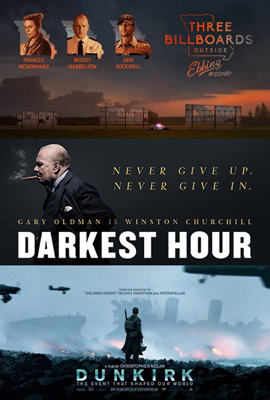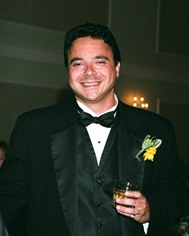 With the Oscars being presented on Sunday, March 4th, I like to focus on the films and performances that I found most memorable. In keeping with the tradition of the late Siskel & Ebert’s “If we picked the Oscars,” here are my standouts for 2017 using the nominees in the main Academy Award categories. While others may try to second-guess Oscar politics with who ‘should win’ or ‘will win,’ I like to keep it simple. In case you missed any of them, these are the films and performances that I’ll remember- simply put, these are the ones:
With the Oscars being presented on Sunday, March 4th, I like to focus on the films and performances that I found most memorable. In keeping with the tradition of the late Siskel & Ebert’s “If we picked the Oscars,” here are my standouts for 2017 using the nominees in the main Academy Award categories. While others may try to second-guess Oscar politics with who ‘should win’ or ‘will win,’ I like to keep it simple. In case you missed any of them, these are the films and performances that I’ll remember- simply put, these are the ones:
Best supporting actress: Allison Janney, “I, Tonya”
As the embodiment of tough love, playing figure skating phenom Tonya Harding’s mother, LaVona could have been an exercise in scenery-chewing. However, Janney gives the chain-smoking, domineering force driving her daughter toward success a villain’s vindication: LaVona, no matter how cruel she may appear, knows she’s right. Never better exemplified than in the diner booth scene where LaVona tells Tonya (Margot Robbie) she pushed to make her better between drags from her cigarette and teasing taunts, Janney just nails it. Not since John Gielgud won an Oscar for playing a similar role in “Arthur” have I seen deadpan delivery and ferocious frankness paired and presented better- Janney deserves an Oscar too.
Best adapted screenplay: Scott Frank & James Mangold and Michael Green, “Logan”
Even with its comic-book base, “Logan” features sharp dialogue and candid character moments that bring gritty realism to its dark and dirty portrait of the aging X-Man Wolverine (Hugh Jackman). In a tone that lends itself more to a film noir with a detective pulled into one last case or a western featuring a retiring gunman’s one last showdown, Scott Frank (Oscar-nominated 20 years ago for his adaptation of Elmore Leonard’s “Out of Sight”) really gets to run with the story laid out by Mangold and Green.
Set in 2029, Wolverine (Jackman) is now living in anonymity as an independent limo driver under his true name, Logan. While trying to get enough money together so that he and a now-mentally deteriorating Professor Charles Xavier (Patrick Stewart) can escape society by buying a boat and living in the middle of the ocean to keep the world safe from Xavier’s ever-increasingly unstable mental powers, Logan is nonetheless drawn into defending his fellow mutants when he crosses paths with a little girl named Laura (Dafne Keen), who is being hunted by government goons. Set up as a swan song for everyone’s favorite mutant superhero, “Logan’s “expletive-filled and ultraviolent. However, it’s in the depiction of the pathos and pain Logan and Xavier experience in their scenes together that stay with you. “Logan’s” script lingers because it echoes its own resonance: when seemingly invincible characters realize they’re eventually going to lose, you know they won’t leave quietly.
“Three Billboards Outside Ebbing, Missouri:” Best actress: Frances McDormand; Best supporting actor: Sam Rockwell; Best original screenplay: Martin McDonagh
Creating a quirky character-riddled micro chasm has always been Martin McDonagh’s forte and in “Three Billboards,” everything gels.
After her daughter is raped and killed not far from her home and in the months where local police have yet to catch the criminal, Mildred Hayes (Frances McDormand) rents three billboards and writes an investigative call-to-action upon them. In a case that’s getting colder, Mildred’s demeanor is becoming cold as well and turns brash and brazen. While the sheriff (Woody Harrelson) sympathizes, he’s doing all he can in the midst of also being personally sidelined by a terminal illness. Mildred’s quest for justice draws ire from the Ebbing townsfolk as kicking an ailing sheriff when he’s down, but also brings Mildred into closer contact with Ebbing deputy Dixon (Sam Rockwell), a temperamental man-child who lives at home with his mother.
While McDonagh fills the town of Ebbing with interesting characters to add atmosphere, its core remains with Mildred and Dixon and, as such, allow McDormand and Rockwell to shine. What makes McDormand and Rockwell stand out is their characters fit into their strengths as actors while also holding something more for them to sink their teeth into: for McDormand, an anger-fueled no-nonsense paired with solitary moments where she tearfully lets her character emotionally break- whether she’s breaking over the loss of her daughter, the town’s backlash over harassing the ill sheriff, or seeing what her frustration has made her become- all combine to make McDormand’s performance special; for Rockwell, playing to an immaturity that becomes a character arc where impulsiveness becomes an asset and being a little ‘nuts’ takes on its own nobility.
It’s a heady job McDonagh has in creating a small-town with slightly off-center people but, grounded by McDormand and Rockwell, he hits a bulls-eye.
Best actor: Gary Oldman, “Darkest Hour”
There are actors who become their characters and actors who put themselves into the characters they’re playing- Oldman does both portraying Winston Churchill in “Darkest Hour.”
Set at Churchill’s appointment to Prime Minister as World War II has the Nazis breathing down Britain’s neck, Churchill has the unenviable position not to acquiesce. While make-up, speech and mannerisms go a long way to make Oldman’s performance seamless, it’s in what we love best about Oldman that holds sway. The tenacious nature of a stubborn bulldog that still has a fire within to rebuke any plans to surrender is what Oldman delivers and, paired with scenes that show a soft underbelly as in the scene where Churchill travels in London’s underground to ask common people if his plans not to bow down and fight are justified in the popular consensus, makes “Darkest Hour” Oldman’s moment. Always the rebel we depend on, Oldman’s role as Churchill fits him better than it would most actors.
Best film: “Dunkirk”; Best director: Christopher Nolan
Orchestrating an epic while making it intimate makes for great art, and Christopher Nolan does just that with “Dunkirk.” Putting us into the situations that unfolded during Britain’s daring rescue of 330,000 soldiers from Dunkirk, France’s shoreline in World War II without a lot of dialogue to dull the sensation, “Dunkirk’s” a “director’s movie:” a visceral experience that puts you alongside the protagonists as the events play out. Feeling like you are there, Nolan slowly tightens the tension by placing you squarely into the thick of things as the battle’s inherent danger develops.
By seamlessly transporting us between vantage points from land, sea or air in same-time scenarios, Nolan creates an intimacy despite the film’s grand scale, and that’s what’s most impressive- he smartly places the audience in small-scale situations for stronger effect.
Expertly capturing the chaos at Dunkirk that concluded with Winston Churchill calling its resolution a “miracle,” Christopher Nolan creates his own cinematic miracle that serves as a time capsule for the resiliency and resourcefulness of the human spirit – it’s a testament to heroism in the most harrowing of times.
Enjoy this year’s Oscars and in discovering the future Oscar winners of 2018.
